
Hardware stores, sometimes known as DIY stores, sell household hardware for home improvement including: fasteners, building materials, hand tools, power tools, keys, locks, hinges, chains, plumbing supplies, electrical supplies, cleaning products, housewares, tools, utensils, paint, and lawn and garden products directly to consumers for use at home or for business. Many hardware stores have specialty departments unique to its region or its owner's interests. These departments include hunting and fishing supplies, plants and nursery products, marine and boating supplies, pet food and supplies, farm and ranch supplies including animal feed, swimming pool chemicals, homebrewing supplies and canning supplies.
Discount stores offer a retail format in which products are sold at prices that are in principle lower than an actual or supposed "full retail price". Discounters rely on bulk purchasing and efficient distribution to keep down costs.
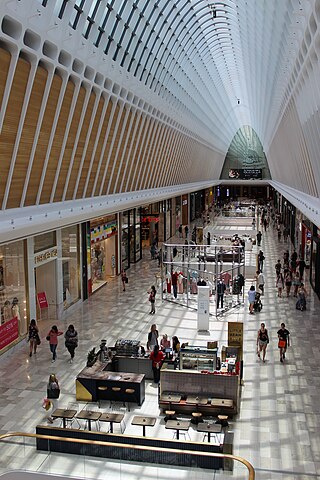
Eastland Shopping Centre is a super-regional shopping centre complex located in the eastern Melbourne suburb of Ringwood, Victoria, Australia. The fourth-largest shopping centre in Australia, it first opened on 31 October 1967 and has since grown to host over 340 retail stores and services.
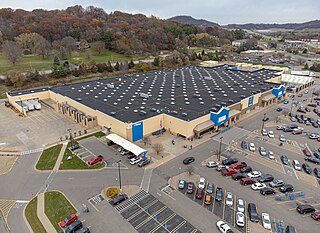
A big-box store, a hyperstore, a supercenter, a superstore, or a megastore is a physically large retail establishment, usually part of a chain of stores. The term sometimes also refers, by extension, to the company that operates the store. The term "big-box" references the typical appearance of buildings occupied by such stores.

Grace Bros was an Australian department store chain, founded in 1885. It was bought by Myer in 1983. There were 25 stores across New South Wales and the Australian Capital Territory plus a few in Victoria, until they were re-branded under the Myer name in 2004.
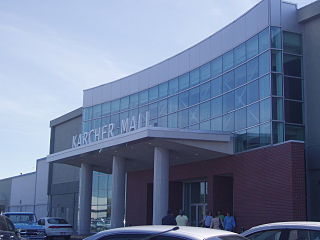
District 208, formerly Karcher Mall, is a shopping center located in Nampa, Idaho, United States. It originally opened as an enclosed shopping mall in August 1965 with Buttrey Food & Drug, Tempo, and Sprouse-Reitz as anchor stores. It was the largest shopping mall in the Treasure Valley until the opening of Boise Towne Square in Boise in October 1988. The shopping center is anchored by Big 5 Sporting Goods, Jo-Ann Fabrics and Crafts, Mor Furniture, and Ross.

Direct Factory Outlet (DFO) is a brand of factory outlet shopping centres in Australia. They are large-floor warehouse buildings containing partitioned stores where retail outlets sell excess or previous seasons' stocks at reduced prices. Vicinity Centres have full or partial ownership of seven of the eight stores.

Bayside Shopping Centre is a super regional shopping centre in the suburb of Frankston on the Mornington Peninsula of Melbourne.
Stockland Green Hills, formerly Green Hills Shopping Centre, is a large indoor/outdoor shopping centre located in East Maitland, New South Wales, Australia.

The Spotsylvania Towne Centre is a mall located in Spotsylvania County, Virginia, on Virginia State Route 3, less than a mile west of Interstate 95, and directly across from the Central Park shopping and dining complex. The mall is owned and developed by Cafaro Company. The property was renamed as "Spotsylvania Towne Centre" at the beginning of a $12 million renovation project. The project, completed in 2009, included an extensive remodeling of the mall's interior and exterior. At the same time, construction was begun on an outdoor lifestyle center called "The Village." The mall's anchor stores are Guitar Center, Dick's Sporting Goods, Belk, Costco, JCPenney, and Macy's. There is 1 vacant anchor that was once Sears. The Splitsville Bowling Alley is connected to a movie theater. The mall also houses over 150 specialty stores and restaurants.
Midway Crossings is an enclosed shopping mall located at 7795 West Flagler Street next to the Palmetto Expressway in Miami, Florida. The anchor stores are The Home Depot, Burlington Coat Factory, Costco, Marshalls, Ross Dress for Less, and a Florida Department of Highway Safety and Motor Vehicles office.

Terrence Mark Snow was an Australian businessman, accountant, entrepreneur, and philanthropist based in Canberra in the Australian Capital Territory.
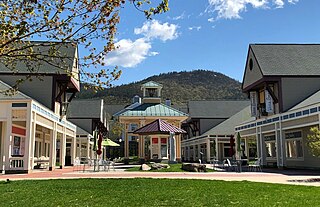
Settlers Green is an outlet shopping center in North Conway, New Hampshire, United States. The center was built on the location of the former White Mountain Airport and opened in February 1988. It has since expanded to a former industrial site and a former competing shopping center. Settlers Green is divided into four parts: the Outlet Village, which contains mostly outlet stores; Settlers Crossing, which has a combination of lifestyle and specialty retailers; Settlers Corner, which houses a Staples, Home Depot, and HomeGoods; and Streetside, which features upscale retailers. With over 500,000 square feet (46,000 m2) of retail space, it is the largest shopping center in the White Mountains Region.

Westgate Shopping Center was the first fully enclosed shopping mall in Georgia. It opened in 1961, a year after Eastwood opened in Birmingham, Alabama. Like Eastwood, Westgate had no department store anchors but was prominently anchored by five and dime store JJ Newberry's.
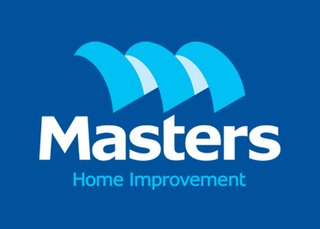
Masters Home Improvement was an Australian home improvement chain operated by two retailers; Woolworths and Lowe's. It was established as a way for Woolworths to enter the hardware retail market, which has been historically dominated by Bunnings, owned by their competitor Wesfarmers. These two companies also compete with each other with groceries, liquor, fuel and general merchandise. Most of the stores shared the same format of conventional Lowe's stores and borrowed elements from Bunnings Warehouse for the garden and trade areas.

Canberra Outlet Centre is an outlet type discount shopping centre located on the edge of Fyshwick, a light industrial suburb located in the southeast of Canberra. In addition to providing retail space for 100 specialty outlet stores, the Homewares/Furniture section of the centre is designed for 24 bulky goods retailers, such as furniture and electrical chains. Unlike many other outlet centres, the Canberra site is not adjacent to an airport.

The District Docklands is an indoor/outdoor shopping centre in the suburb of Docklands in the inner-west of Melbourne.
The retail format influences the consumer's store choice and addresses the consumer's expectations. At its most basic level, a retail format is a simple marketplace, that is; a location where goods and services are exchanged. In some parts of the world, the retail sector is still dominated by small family-run stores, but large retail chains are increasingly dominating the sector, because they can exert considerable buying power and pass on the savings in the form of lower prices. Many of these large retail chains also produce their own private labels which compete alongside manufacturer brands. Considerable consolidation of retail stores has changed the retail landscape, transferring power away from wholesalers and into the hands of the large retail chains.















